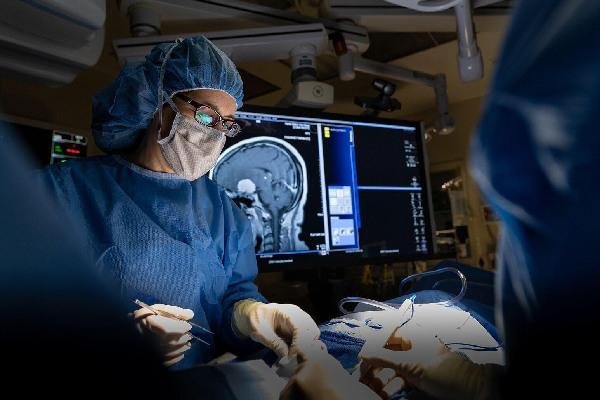Specialities in diagnosis and treatment of complicated brain, spine, and nervous system diseases define neurosurgery centres. For patients with diseases including brain tumours, spine problems, and nerve injuries, these centres are absolutely vital in offering treatment.
purpose of this essay will be to investigate what neurosurgery centres are, the treatments they offer, and what patients should expect while visiting these specialised institutions.
What is a Neurosurgery Center?
A neurosurgery center is a medical facility equipped with the advanced technology, highly trained neurosurgeons, and multidisciplinary teams needed to handle complex neurological conditions. These centers focus on:
- Brain Surgeries: Treatment of brain tumors, aneurysms, traumatic injuries, and movement disorders.
- Spinal Surgeries: Managing spinal deformities, herniated discs, spinal cord injuries, and tumors.
- Peripheral Nerve Surgeries: Addressing nerve compression, neuropathies, and nerve injuries.
Neurosurgery centers often operate in collaboration with other specialists, including neurologists, oncologists, radiologists, and pain management experts, to provide comprehensive care.
Key Services Offered by Neurosurgery Centers
1. Diagnostic ServicesNeurosurgery centers utilize state-of-the-art diagnostic tools to evaluate neurological conditions precisely. Some of the key diagnostic services include:
- MRI (Magnetic Resonance Imaging)
- CT (Computed Tomography) Scans
- Electroencephalogram (EEG)
- Functional Brain Mapping
- Intraoperative Monitoring
These diagnostic techniques help identify the exact location and nature of neurological disorders, allowing surgeons to create effective treatment plans.
2. Surgical Interventions
Neurosurgery centers perform various surgical procedures using the latest technology, such as minimally invasive techniques and robotic-assisted surgeries. Common surgical interventions include:
- Craniotomy: Surgical removal of a section of the skull to access the brain.
- Spinal Fusion: Joining two or more vertebrae to stabilize the spine.
- Endoscopic Brain Surgery: Minimally invasive surgery using an endoscope for brain tumors.
- Microdiscectomy: Removal of herniated disc material to relieve nerve pressure.
- Deep Brain Stimulation (DBS): Implantation of electrodes to treat movement disorders.
3. Rehabilitation Services
Post-surgery rehabilitation is a critical component of treatment at neurosurgery centers. Rehabilitation services help patients regain strength, mobility, and cognitive function. Typical rehabilitation services include:
- Physical Therapy
- Occupational Therapy
- Speech Therapy
- Neuropsychological Support
A team of specialized therapists customizes rehabilitation programs to meet the individual needs of each patient.
What Makes a Neurosurgery Center Stand Out?
When choosing a neurosurgery center, several factors distinguish a top-tier facility from the rest. Look for centers that offer:
- Board-Certified Neurosurgeons: Experienced and highly trained professionals.
- Advanced Technology: Access to robotic-assisted surgery, intraoperative MRI, and 3D imaging.
- Multidisciplinary Approach: Collaboration among specialists to provide comprehensive care.
- Patient-Centered Care: Personalized treatment plans and support services.
- Focus on Minimally Invasive Procedures: Reduced recovery times and better outcomes.
Preparing for Your Visit to a Neurosurgery Center
Visiting a neurosurgery center can be overwhelming, but adequate preparation can ease the process. Here’s what you should do:
- Collect Medical Records:
- Bring copies of your medical history, diagnostic tests, and any previous treatments.
- Prepare a List of Questions:
- Inquire about treatment options, expected outcomes, and recovery timelines.
- Know Your Insurance Coverage:
- Verify your insurance coverage for the procedures and consultations.
- Bring a Support System:
- Have a family member or friend accompany you for support and note-taking.
Choosing the Right Neurosurgery Center: Key Considerations
Selecting the right neurosurgery center is vital for successful treatment and recovery. Here are some factors to consider:
1. Experience and Specialization
Choose a center with neurosurgeons who specialize in treating the specific condition you are facing, whether it is a brain tumor, spine disorder, or nerve issue.
2. Reputation and Outcomes
Review the center’s success rates, patient testimonials, and accreditations to assess the quality of care provided.
3. Range of Services
A comprehensive neurosurgery center offers not just surgery, but also diagnostics, rehabilitation, and long-term follow-up care.
4. Cutting-Edge Technology
Opt for a center that employs the latest technological advancements, such as robotic-assisted surgery and intraoperative imaging.
Benefits of Treatment at a Neurosurgery Center
Choosing a specialized neurosurgery center for your care offers several benefits:
- Access to Expertise: Board-certified neurosurgeons and specialists.
- Comprehensive Care: Multidisciplinary teams for holistic treatment.
- Minimally Invasive Options: Reduced pain and faster recovery.
- State-of-the-Art Facilities: Advanced imaging and surgical technology.
- Customized Rehabilitation: Tailored post-operative care plans.
Conclusion
For patients suffering with complicated neurological diseases, neurosurgery centres offer a necessary service. From diagnosis to treatment and rehabilitation, these centres provide a complete, patient-centered approach guaranteeing best results. Patients can be sure they will get the finest available treatment by selecting a centre with a solid reputation, seasoned surgeons, and state-of-the-art technologies. Whether you or a loved one needs brain, spine, or nerve surgery, a qualified neurosurgery centre will have the knowledge and tools needed for a good recovery.
______________________________
For prospective patients, this well-organized and thorough review of neurosurgery centres made possible by headers, subheadings, bullet points, and succinct paragraphs is simple and educational.



More Stories
Dental Implant Pricing: Expert Guide & Insights
Your Path to Parenthood: Affordable & Transparent Surrogacy
Multivitamins for Women’s Stress Relief